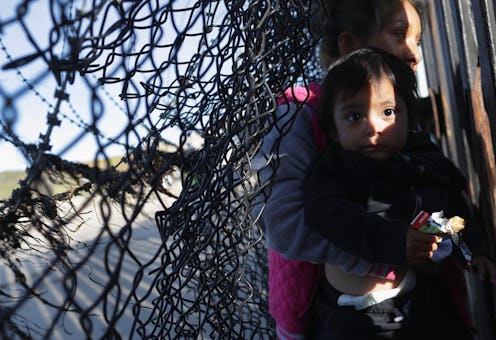
The 2018-2019 federal government shutdown is now the longest in American history and its ramifications are being felt throughout the country. Indeed, how the government shutdown is hurting immigrants it quite shocking, given that it's resulted in court hearing cancellations for nearly 43,000 immigrants so far. This number is quickly growing as the shutdown lingers.
A new report from the Transactional Records Access Clearinghouse at Syracuse University revealed this striking number of immigrant hearing cancellations and also shed further insight into the shutdown's impact on immigration proceedings. The report noted that, in addition to the 43,000 hearings that have already been cancelled, 20,000 more will be cancelled each week that the government remains closed. As NPR pointed out, this means that, if the government is shut down through the end of January, over 100,000 immigrants will be impacted by cancelled hearings.
These hearing cancellations are particularly jarring considering the long wait time immigrants must endure before their case even proceeds to court. The report noted that "individuals impacted by these cancellations may have already being waiting two, three, or even four years for their day in court." Moreover, the report indicated that Judge Dana Marks, the former president of the National Association of Immigration Judges, said during a Jan. 9 interview on PBS that these same immigrants could now have to wait another three or four years for their cancelled hearings to be rescheduled.
Immigration hearings are held to determine an immigrant's eligibility to stay in the United States. As NPR noted, for some, delayed hearings could be highly detrimental, with reporter Laura Benshoff indicating on Jan. 2 that "pushing back a hearing could mean an immigrant who qualifies for status now may not in the future if immigration policies are restricted." Though, for others, a cancelled hearing could serve as an unexpected benefit. "If an immigrant doesn't have a strong claim for status, a delay means more time in the U.S. and maybe even qualifying for another form of immigration status in the interim," Benshoff reported via NPR.
Either way, cancelled hearings further contribute to a growing backlog in an already overloaded immigration system, the Clearinghouse's report noted. "Each week the shutdown continues the practical effect is to add thousands of cases back onto the active case backlog," the report indicated. "[This backlog] ... had already topped eight-hundred thousand (809,041) as of the end of last November."
CNN reported that the Transactional Records Access Clearinghouse obtained the cancellation-related data by counting scheduled cases in government data it acquired through Freedom of Information Act (FOIA) requests. The outlet noted that immigration lawyers and judges believe that the report's figures do indeed reflect reality.
"We do think every day cases are being cancelled. We're looking at several thousand a day," Judge Ashley Tabaddor, the president of the National Association of Immigration Judges, told CNN. "[The Clearinghouse's number] is consistent with our estimates. I don't know the exact number but it's definitely in the ballpark."
The reverberations of the government shutdown are certainly being felt by many, including immigrants awaiting hearings. The longer the shutdown continues, more and more immigrants will be impacted by these cancellations — and the already significant immigration case backlog will continue to grow.